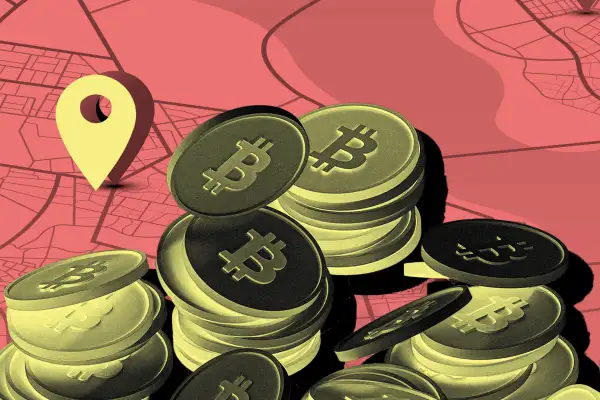How to Buy Crypto and Bitcoin Anonymously or Without Verification
Money is not a client of any investment adviser featured on this page. The information provided on this page is for educational purposes only and is not intended as investment advice. Money does not offer advisory services.

It has gotten much easier to buy crypto over the years. Today, you can buy the digital assets through PayPal, and numerous traditional brokerage firms even let their customers trade cryptocurrencies (despite many of them being reluctant to do so when the asset class was in its infancy).
But even now, most brokerage firms have some safeguards in play. Most of them limit you to the most established cryptos, such as bitcoin and ethereum, while others only provide access to crypto-themed exchange-traded funds.
However, even if you’re able to purchase crypto through your brokerage, those accounts don’t offer the same level of privacy for their customers, which was a major contributor to bitcoin’s initial success. When it comes to crypto, some investors prefer to operate under the radar and accumulate the asset without getting tracked.
This guide will detail the steps you can take to buy crypto anonymously or without verification.
Create a privacy-focused wallet
Some wallets offer stronger privacy features than others, but you’ll need to narrow your choices if privacy is the priority. For example, Wasabi is an open-source, non-custodial Bitcoin desktop wallet designed to improve on-chain privacy (including CoinJoin-style collaborative transactions) while keeping you in control of your keys.
Keep in mind that “private” doesn’t necessarily mean “anonymous,” and privacy features can depend on the wallet’s current infrastructure and coordinator options.
If privacy is your priority, avoid custodial wallets held inside centralized exchange/brokerage accounts, since those platforms typically link activity to your identity. Also note that using any self-custody wallet with a centralized platform (for buying/selling or cashing out) can connect your identity to wallet addresses through deposits/withdrawals.
You may consider utilizing assets like Monero (XMR) and Zcash (ZEC), which are specifically engineered for anonymity. Monero is a non-custodial privacy coin that uses stealth addresses to hide transaction histories, while Zcash offers "shielded" transactions that don't require users to undergo KYC verification or reveal personal information to the public blockchain. These options allow you to maintain strict privacy when making crypto transactions and storing assets, provided you use a compatible, open-source wallet.
Exchange crypto at public locations
Crypto buyers can avoid leaving a digital trail by exchanging crypto at public locations. While this transaction will still show up on the blockchain, it makes you anonymous. You won’t have to enter your ID or provide any personal information when making these types of crypto transactions so long as you’re using a privacy-focused wallet.
Decentralized, peer-to-peer (P2P) platforms like Bisq and RoboSats, make it easier to find people in your area who want to trade crypto. You will then have to meet the other person in a public location, such as a library or cafe. For large transactions, it’s best to not show up alone while taking other measures to ensure your safety.
Crypto enthusiasts who make in-person deals have to provide the seller with their wallet’s address. While there are social media groups that connect people who want to conduct in-person, P2P crypto transactions, this route has become less common.
Bitcoin ATMs
Bitcoin ATMs are a great resource for accumulating bitcoin while remaining anonymous, but this option is only good for people who live near those machines. There are an estimated 39,653 bitcoin ATMs in the world, but 88.6% of them are located in North America, according to Coin ATM Radar.
You can buy or sell cryptocurrencies through these ATMs, but you may have limited options beyond bitcoin. If you want to buy crypto, you have to insert cash or a card; on the other hand, you will receive cash if you sell bitcoin through these machines.
Importantly, you don’t need a crypto wallet beforehand to use a bitcoin ATM, and that’s where anonymity comes into play. If you do not have a wallet, a bitcoin ATM will automatically create a digital wallet for you. Some bitcoin ATMs do not require any ID to create that crypto wallet or to enact a transaction. When using these machines, you’ll also receive a private key for the wallet it creates, allowing you to then accumulate crypto under the radar.
You can also create a digital wallet in advance and input that information when you use a bitcoin ATM to make your transactions. However, if you ever use your ID for a bitcoin ATM transaction, your wallet is no longer anonymous. Another considerable downside is that bitcoin ATMs have comparatively high fees, with some charging as high as 10% of a transaction’s value.
Prepaid crypto debit cards
Prepaid crypto debit cards are like regular prepaid debit cards, but they revolve around crypto. These financial products allow you to make crypto transactions without providing any personal information. You can load up on crypto with these cards and then use them to make purchases.
KemyCard, for example, is one of the top virtual crypto debit cards to consider. The card makes it easy to buy crypto and use it to make purchases, and it’s accepted worldwide. You don’t have to provide any personal information to open a Kemy Card, so you can operate anonymously when you buy and sell crypto.
There are some associate fees and restrictions, though. Beyond a monthly maintenance fee of $2, KemyCard charges 5% for when you replenish funds, the debit card is only good for three years and there is a transaction limit of up to $100,000 per month.
Should you buy crypto anonymously?
Buying crypto anonymously makes it more difficult for the government to track your financial transactions. Offline transactions also minimize the risk of cyberattacks resulting in lost bitcoin. While some crypto platforms have robust bitcoin insurance policies, others are not adequately prepared for breaches.
However, be mindful that making anonymous crypto transactions will affect liquidity. You will have fewer people to trade with, and private crypto transactions may incur higher fees. While centralized platforms like Coinbase and Robinhood don’t offer any privacy and are more prone to cyberattacks, they can cost a lot less in the long run.
For most people, it’s better to sign up for a crypto platform that collects details about users and even verifies your ID when you make purchases — no different than buying stocks with a traditional brokerage account. However, if your country bans crypto or you want to make sure no one can track your wealth, anonymous transactions may be the better option for you.




